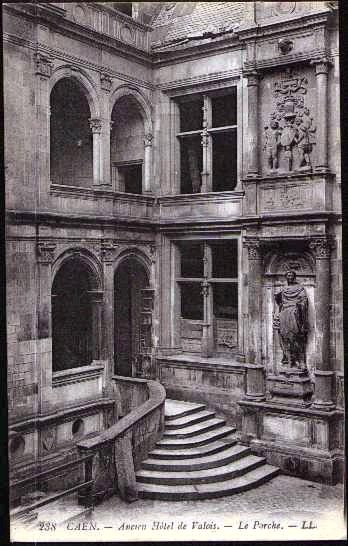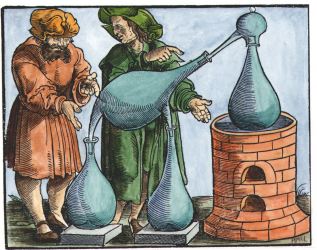| Author | Post |
|---|
Carolyn Dougherty
Member

|
Posted: Mon Jul 2nd, 2012 05:27 pm |
|
| I'm wondering if anyone here could point me to contemporary alchemical references to the idea that the purity/character/personality/motivation of the experimenter affects the outcome of his/her experiments. I've found copious references to this idea in the secondary literature, and suggestions that alchemists often believed that those with impure motives could not succeed in their work, but the closest to a contemporary reference I've identified so far is an allusion to the Wisdom of Solomon ('into a wicked heart wisdom shall not enter') in Platte's Caveat to Alchemists. Thanks in advance for any assistance you can offer.
|
Paul Ferguson
Member

| Joined: | Fri Feb 15th, 2008 |
| Location: | |
| Posts: | 1538 |
| Status: |
Offline
|
|
Posted: Tue Jul 3rd, 2012 02:58 am |
|
Carolyn Dougherty wrote:
I'm wondering if anyone here could point me to contemporary alchemical references to the idea that the purity/character/personality/motivation of the experimenter affects the outcome of his/her experiments. I've found copious references to this idea in the secondary literature, and suggestions that alchemists often believed that those with impure motives could not succeed in their work, but the closest to a contemporary reference I've identified so far is an allusion to the Wisdom of Solomon ('into a wicked heart wisdom shall not enter') in Platte's Caveat to Alchemists. Thanks in advance for any assistance you can offer.
Hi,
I agree that modern writers on alchemy often rabbit on about this without quoting any sources.
One of the few references I can think of off the top of my head is Nicolas Valois (1475-1541), who wrote in his Cinq Livres:
'[Alchimie] est un secret réservé du bon Dieu pour ses Elus qui font ses divins commandements ; lesquels sont par lui choisis selon la pureté de leur cœur.'
'Alchemy is a secret reserved by the good Lord for His Elect who perform his divine commandments; which persons are chosen by him according to their purity of heart.'
Full text downloadable from here:
http://www.bnam.fr/spip.php?article311
Unfortunately I think a lot of nonsense is written about this generation of French alchemists so proceed with caution, but I think if you try and trace Nicolas's intellectual antecedents then you might find some more alchemists who aspired to be 'pure in heart'. De Caix's scholarly paper might be a useful starting-point:
http://alchimie-pratique.org/alchinormand.html
You have a nice cat 
http://homepage.ntlworld.com/carolyn.dougherty/Carolyn_Dougherty/Photos_of_Morgan.htmlAttached Image (viewed 615 times):

|
Carolyn Dougherty
Member

|
Posted: Tue Jul 3rd, 2012 06:51 am |
|
 thank you--he's not the sharpest tool in the box, but he's very photogenic! thank you--he's not the sharpest tool in the box, but he's very photogenic!
Thanks for the citation. I hope the secondary sources aren't completely wrong about this, as I was planning to go somewhere with this notion....
I'll give an example of what I'm hoping to find (based on the fact that the secondary sources do discuss it)--a Renaissance agricultural experimenter describes a process he has invented for fertilising a field, 'mix this and that, act on it in such a way, apply to your field, and crops will grow large and strong, unless human sin intervenes to diminish the effectiveness of this formula.'
In alchemical texts I do notice vague statements that 'only the wise can understand', but that's essentially a tautology; what I'm looking for/hoping to find is statements that one or more characteristics of the experimenter has an influence on the results of the experiment.
This is not something that would only be true of alchemy:
http://www.albany.edu/~scifraud/data/sci_fraud_3224.html
[I'm distressed that the word 'fraud' appears in the URL as well as in the text--the book described on this web page has nothing to do with fraud, but rather with how individual characteristics can't be eliminated from the physical process of experimentation.]
|
Tom Willard
Member

| Joined: | Mon May 5th, 2008 |
| Location: | Tucson, Arizona USA |
| Posts: | 96 |
| Status: |
Offline
|
|
Posted: Wed Jul 4th, 2012 07:00 am |
|
| Re: "The Forbidden Book": There are strong resemblances in characterization and plotting to the novels of Charles Williams--not only the evil magus, mentioned in one of the linked reviews, but the women under his spell and endangered until a good person steps in and sees through the evil, sees that it is silly at root. The characters are "cardboard" (as was often said of Williams's), but there is some integrity to the resolution of the crisis, and of course real insight into a real book of early modern alchemy.
|
Carl Lavoie
Member
| Joined: | Wed Feb 25th, 2009 |
| Location: | Canada |
| Posts: | 215 |
| Status: |
Offline
|
|
Posted: Sat Jul 7th, 2012 01:58 am |
|
.
A fairly recent instance (1775) of this belief can be found at the end of the third chapter of Coutan’s Le Grand Œuvre dévoilé, page 32 :
http://books.google.ca/books?id=O1w6AAAAcAAJ&printsec=frontcover&source=gbs_ge_summary_r&cad=0#v=onepage&q&f=false
“Je ne m’amuserai point ici à vous exhorter à faire un usage convenable des avantages de notre secret, car je suis très-persuadé qu’il sera toujours impénétrable à ceux dont l’intention n’est pas droite. Je dis plus, si, par le plus grand malheur qui puisse m’arriver, mon intention venoit à changer, & que je voulusse faire pour moi ou par rapport à moi, ce que je ne dois faire que pour les autres, devenu profane par cette vue purement humaine, la matiere se refuseroit à mon travail, & la nature à mes desseins.”
.Last edited on Sat Jul 7th, 2012 01:59 am by Carl Lavoie
|
Carolyn Dougherty
Member

|
Posted: Sat Jul 7th, 2012 01:06 pm |
|
Thanks Carl--it is a little later than what I'm looking for, but I do hope to point out as one of the arguments in this work that this idea of the physicality of experimentation has persisted up to current times despite it being inconsistent with the 'ideology' of non-quantum scientific method.
|
Chad_Engbers
Member

| Joined: | Tue Jul 5th, 2011 |
| Location: | Michigan USA |
| Posts: | 7 |
| Status: |
Offline
|
|
Posted: Sun Sep 2nd, 2012 10:57 pm |
|
Carolyn,
I'm quite late to this party, I see, and I'm not sure my suggestions will be helpful to you any longer, but you might look at the George Ripley's Compound of Alchemy, which begins with a lengthy exhortation to repentance, humility, and holy living in general.
I don't have my copy close at hand, but as I recall Ripley does not come out and say that the moral failing in the experimenter will harm the experiment, but he at least strongly implies that moral rectitude is a prerequisite for doing good alchemy.
cae
|
Carolyn Dougherty
Member

|
Posted: Mon Sep 3rd, 2012 06:55 am |
|
Thanks Chad--I've actually (at the moment) gathered (I think) enough evidence from alchemical work to support the arguments I want to make, but will go look for Ripley anyway. I'm now struggling with the scientific method section--Merton is proving most useful here so far. My intention at this point is to turn this argument into a 20 minute talk to present at this conference:
http://ichstm2013.com/
Thanks for taking the time to help out.
|
Paul Ferguson
Member

| Joined: | Fri Feb 15th, 2008 |
| Location: | |
| Posts: | 1538 |
| Status: |
Offline
|
|
Posted: Mon Sep 3rd, 2012 12:41 pm |
|
Carolyn Dougherty wrote:
will go look for Ripley anyway.
Available here:
http://www.alchemywebsite.com/tcbcompound.html
|
Carolyn Dougherty
Member

|
Posted: Mon Sep 3rd, 2012 02:59 pm |
|
Excellent, thank you  I admit that almost all the texts I've read and am quoting so far are prose rather than verse. I admit that almost all the texts I've read and am quoting so far are prose rather than verse.
|
Alexander Guthrie Stewart
Member
| Joined: | Sat Feb 16th, 2008 |
| Location: | |
| Posts: | 192 |
| Status: |
Offline
|
|
Posted: Mon Sep 3rd, 2012 10:46 pm |
|
There's also Thomas Norton, Ordinal of Alchemy. From the Early English text society edition, 1975, page 12 of the text, line 253 onwards:
And forasmoch that no man may hir funde
But only bi grace, she is holi of hir kynde.
Also it is a worke and cure dyvyne
Fowle copyr to make gold or syluere fyune.
No man may fynde such changis bu his thoght
Of diuers jyndis which goddish hondis wrought:
For goddis coniunccions man may not undo,
But if is grace consent fully therto
More lower on the page and page 13. Norton is definitely of the opinion that you have to be a good holy person to achieve the stone.
Hmm, did you write 'scientific method'? That's a tricky subject in itself, almost as bad as alchemy.
|
Carolyn Dougherty
Member

|
Posted: Tue Sep 4th, 2012 07:08 am |
|
Excellent, thank you. It's turning out to be worse, as a matter of fact--as I mentioned, Merton's sociology of science is going where I want to go, but am now attempting to resort to GCSE revision material to get some kind of hard and fast definitions about who can and can't do science. It's paradoxical in itself--on the one hand, there are dozens of 'science in the home' books for children, but on the other 'scientists' are often portrayed, intentionally or not, as a special breed of human.
|
Alexander Guthrie Stewart
Member
| Joined: | Sat Feb 16th, 2008 |
| Location: | |
| Posts: | 192 |
| Status: |
Offline
|
|
Posted: Tue Sep 4th, 2012 03:34 pm |
|
Oh dear, that all sounds difficult.
As far as I am concerned, anyone can do science, but what they need is a theory and a means of testing it in the real world, i.e. science depends on the interaction of theory and practise to better understand how things work. But that is my own understanding based on reading a number of books and other things and having a science degree, and is not so applicable to the late medieval period. But people then were doing 'science' of a sort, just that the theory and important people's ideas ranked much higher than the experiments themselves.
There are of course all sorts of cultural things about who can and can't do science, but alchemy at least has always been open to more than just an educated elite.
|
Carolyn Dougherty
Member

|
Posted: Tue Sep 4th, 2012 05:03 pm |
|
What I'm writing about is the idea that modern science shares with both the Catholic and Anglican churches the idea that one's character, personality or spiritual development does not affect one's ability to perform experiments (or sacraments in the churches' case)--if you follow the rules you will get the appropriate results. It seems, however, that a successful alchemist must be a particular kind of person--perhaps not a member of the educated elite, as you say, but he/she must possess the personal attributes the writers cited in this comment thread describe. Alchemy shares this characteristic with craft work, as I'll discuss in my paper; it also shares this characteristic with science as it's actually done, rather than as it's presented in theory.
|
Alexander Guthrie Stewart
Member
| Joined: | Sat Feb 16th, 2008 |
| Location: | |
| Posts: | 192 |
| Status: |
Offline
|
|
Posted: Tue Sep 4th, 2012 11:09 pm |
|
Ah okay, that makes sense.
It'll be interesting to see what you have when you are finished.
|

Current time is 09:33 am | Page: 1 2   |
|

